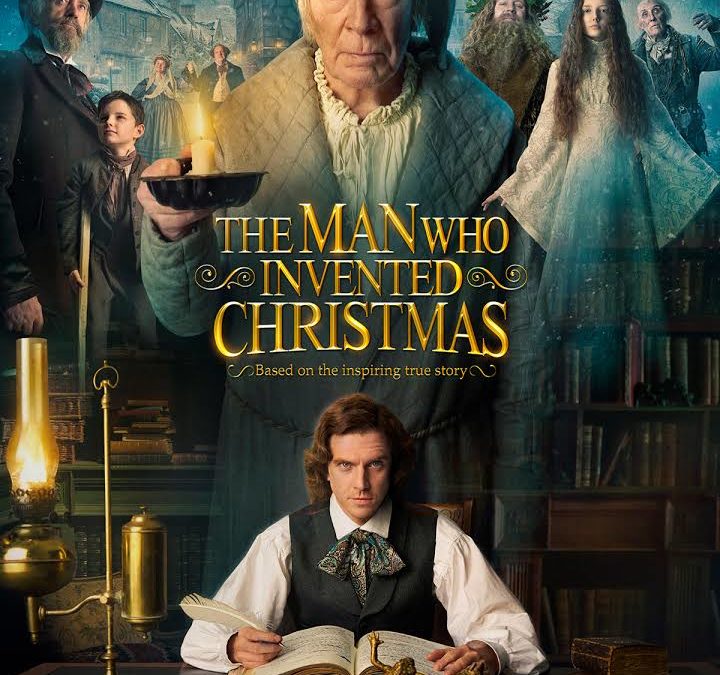The Man Who Invented Christmas
Film 2017
–Review by Jesse Caldwell
“The Man Who Invented Christmas,” a film about how Charles Dickens created his brilliant chef-d’oeuvre, “A Christmas Carol,” is one of those movies that I wound up loving even more than I hoped. Based on a novel by Les Standiford, Director Bharat Nalluri’s motion picture is a masterfully written, acted, and edited story of how Dickens, and ultimately his world, were “abducted” into the world of his story, and in doing so, how that story transformed the way the world celebrated Christmas.
When we meet the beloved and successful British novelist Dickens in 1843, he is suffering from several failed books and a mountain of debt. Financially and artistically, he cannot afford another flop. This, of course, leads to even more pressure, resulting in a writer’s block. Like a good preacher, though, he begins to see and hear little things we preachers listen to in the ordinary flow of life that birth the ideas of our sermons, and in his case, of his story: overhearing his chamber maid telling his children a Christmas tale involving ghosts; the cruel and selfish condemnation of the poor by the husband of an admirer; the miserable funeral of a greedy old rich man attended by only two people; stray comments and odd scenes from people on the street; the precious, endearing ways of his crippled little nephew. These ideas swirl around in his head in a maddening, frenzied whirlwind, until the characters of the book veritably come alive in his mind, most notably, of course, Ebenezer Scrooge, beautifully played by Christopher Plummer. The players are assembled but have no script. This cinematic jewel shows us how they not only got their lines but how they become real people, and abduct us into their world.
Dan Stevens, late of “Downton Abbey” fame, makes Dickens come alive with the most wonderful expressions in his flashing blue eyes and inflections in his luxuriant voice. We can see ourselves in Dickens as we see him fighting with Scrooge, which is to say fighting his own demons of poverty, shame, anger and resentment. Much as Jacob wrestled with an angel all night, helping him find who he really was, Dickens wrestles with the humiliation of his childhood, being forced to work in a boot blacking factory after witnessing his father arrested and thrown into debtor’s prison. His complex and strained relationship with his loved one, in this case his father who comes to live with him, is also something with which many viewers wrestle. Charles Dickens’ inner battle is a looming publication deadline, something again with which we can identify as we all try to beat our deadlines, even as we draw closer to that ultimate deadline when our clocks and breath both run out.
Happily, Dickens conquers his demons, finishes the book in time, changes his plans to kill off Tiny Tim, forgives and embraces his father, and repents of his decision to fire his maid, whose Christmas story inspired him to write the book in the first place. As Shakespeare said, “All’s Well That Ends Well.” All of this is done in a fast paced, beautifully filmed, and brilliantly acted piece of cinema.
Once the story begins taking over his imagination like kudzu, Dickens writes frantically, even maniacally, a man consumed with a something he cannot contain, much like Jeremiah could not contain the fire in his bones. Jacob Marley is like the dead rich man Jesus told about in Luke who wants to warn others of their everlasting doom if they do not see humankind as their business. While Father Abraham denied the rich man’s plea, Dickens allows Marley to do just that, thus paving the way for realization, repentance and reconciliation of Scrooge. The reversal of Tiny Tim’s planned demise gives us a resurrection of sorts, proving that the Dickens and Scrooge both realized the inner battle they fought cast shadows of things “that may be,” not things “that will be.” Even Dickens’ literary arch rival and faux friend, William Makepeace Thackeray, seems redeemed at the end, penning the most gushing review ever about “A Christmas Carol.” But the most critical thing to see in this story is that Scrooge doesn’t just behave in a new way or see the world through new eyes: he becomes a new person. Sound familiar? Like how the Gospel transforms those who accept it into new creations?
The movie tells the tale of how “A Christmas Carol” re-defined the way the world observed this holiday, which apparently was only faintly celebrated in Dickens’ day, by emphasizing charity and gracious giving to the poor, and the warm fellowship of loved ones. As we survey our consumerist celebration of the birth of Christ, which now begins online and in the stores before Halloween, perhaps this film might help us “re-invent” Christmas as Charles Dickens “invented” it for his day.
For those who wish to learn more about Dickens and “A Christmas Carol,” I recommend Dr. Elliot Engels’ recorded lecture, “A New Tune for An Old Carol: Dickens and Christmas.” For those interested in a Christian theological examination of this story, try the video and companion book “The Redemption of Scrooge,” by Rev. Matt Rawle.


I. too, enjoyed the movie! In fact, I have recommended it to many people, BUT I always begin by saying it is the movie with the worst title.